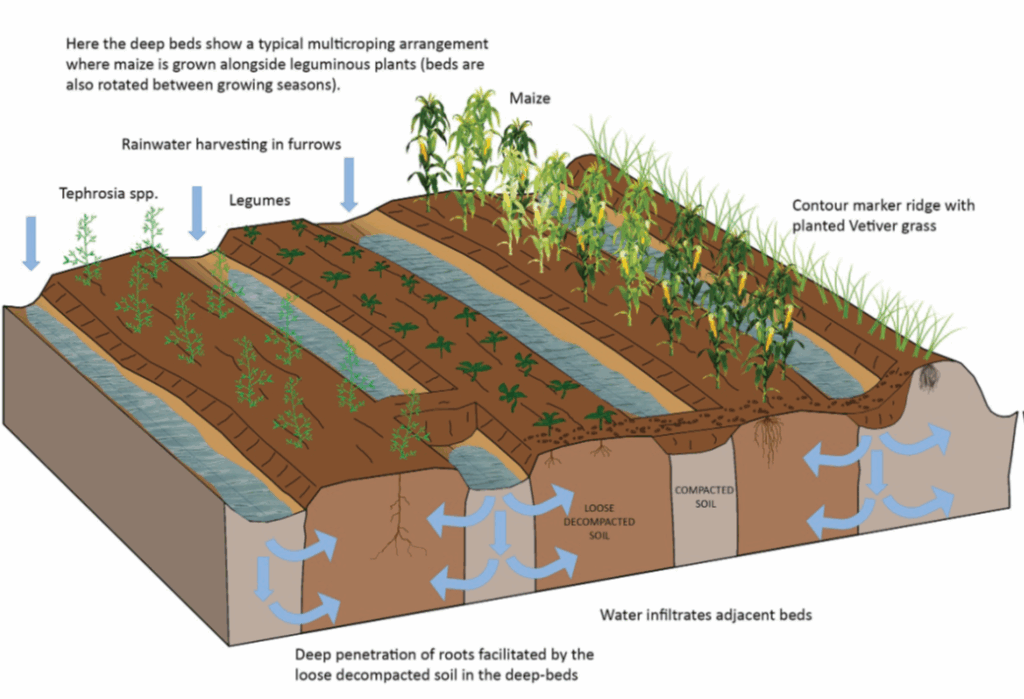Agricultural development in Malawi has long been a focal point for researchers and policymakers seeking to enhance the livelihoods of smallholder farmers and address critical challenges associated with food security and rural poverty (Chisale et al., 2022). Among the agricultural commodities that have gained prominence in recent years, macadamia nuts stand out as a valuable export crop and cereal based-diet supplement, offering potential economic benefits (Table 1) to both farmers and the nation as a whole (Zuza et al., 2023).
The Deep-bed farming system was developed by a small team of practitioners inspired by Francis Shaxson’s work on soil compaction, erosion, and agroecological approaches to land husbandry (Mvula and Dixon, 2021). It concerns dealing with the long-recognized problem of soil compaction, by breaking it, and creating deep beds to reduce runoff and where crops are planted. This system has been demonstrated and adopted by by over 15,000 farmers throughout Malawi, mentored by a charity called Tiyeni Malawi.
The primary objective of this research is to evaluate the opportunities and limitations of deep-bed farming in macadamia agroforestry systems, assessing yield improvements, ecosystem services, and farmer constraints. Additionally, it seeks to advance the scientific understanding of deep-bed farming in intercropping and agroforestry contexts, with a focus on its potential contribution to Malawi’s food and nutritional security.
By achieving these objectives, the study will enhance knowledge of deep-bed farming and contribute to sustainable macadamia industry development, supporting multiple UN Sustainable Development Goals including No Poverty, Zero Hunger, Sustainable Production and Consumption, and Climate Action. The findings have broader implications for agricultural policy, capacity-building, and cooperative practices across various subsectors.
Figure 1. Tiyeni’s deep-bed farming system.

This project is not suitable for CASE funding
Each host has a slightly different application process.
Find out how to apply for this studentship.
All applications must include the CENTA application form.
Choose your application route
The research will employ an interdisciplinary, mixed-methods approach, combining quantitative and qualitative data collection methods. This will involve:
Research skills
Interdisciplinary knowledge
Policy analysis and advocacy
Community engagement and communication
Advisory team: Rupert Douglas (Tiyeni, Malawi): https://www.tiyeni.org/; Andrew Emmott (Neno Macadamia Trust): https://www.nenomacadamiatrust.org/; Rick Brandenburg (NC University): https://www.ces.ncsu.edu/profile/rick-brandenburg/
Year 1: Revise the existing practice of deep-bed farming in Malawi. Extend equivalent experiences of intercropping and agroforestry observed in conventional farming as well as deep-bed farming in other countries in the Global South. Develop a framework for the study and draw out experiences. Conduct pilot interviews and analyse findings amongst smallholder farmers undertaking intercropping and macadamia agroforestry to identify salient indicators of success as well as limitations. Collate pilot measurements on selected farms Present preliminary project outline/results to the school. Pass probation upgrade.
Year 2: Based on the developed framework, undertake more extensive field work and conduct critical analysis, identifying farmers and extension support, to collate/curate existing resources to tackle challenges and propose or repurpose and co-produce new interventions. Present preliminary results at a national conference, prepare article for publication. Collate both socio-economic and agricultural / environmental indicators as measured.
Year 3: Finalise analytical work on data collected in Year 2, return to existing initiatives of deep-bed farming to validate any proposed interventions. Present results at an international conference.
Write thesis, prepare articles for publication.
Please contact Dr Yoseph Araya ([email protected]) or Dr Emmanuel Zuza ([email protected]) for further information and informal discussion about this project.
To apply to this project:
Applications must be submitted by 23:59 GMT on Wednesday 7th January 2026.